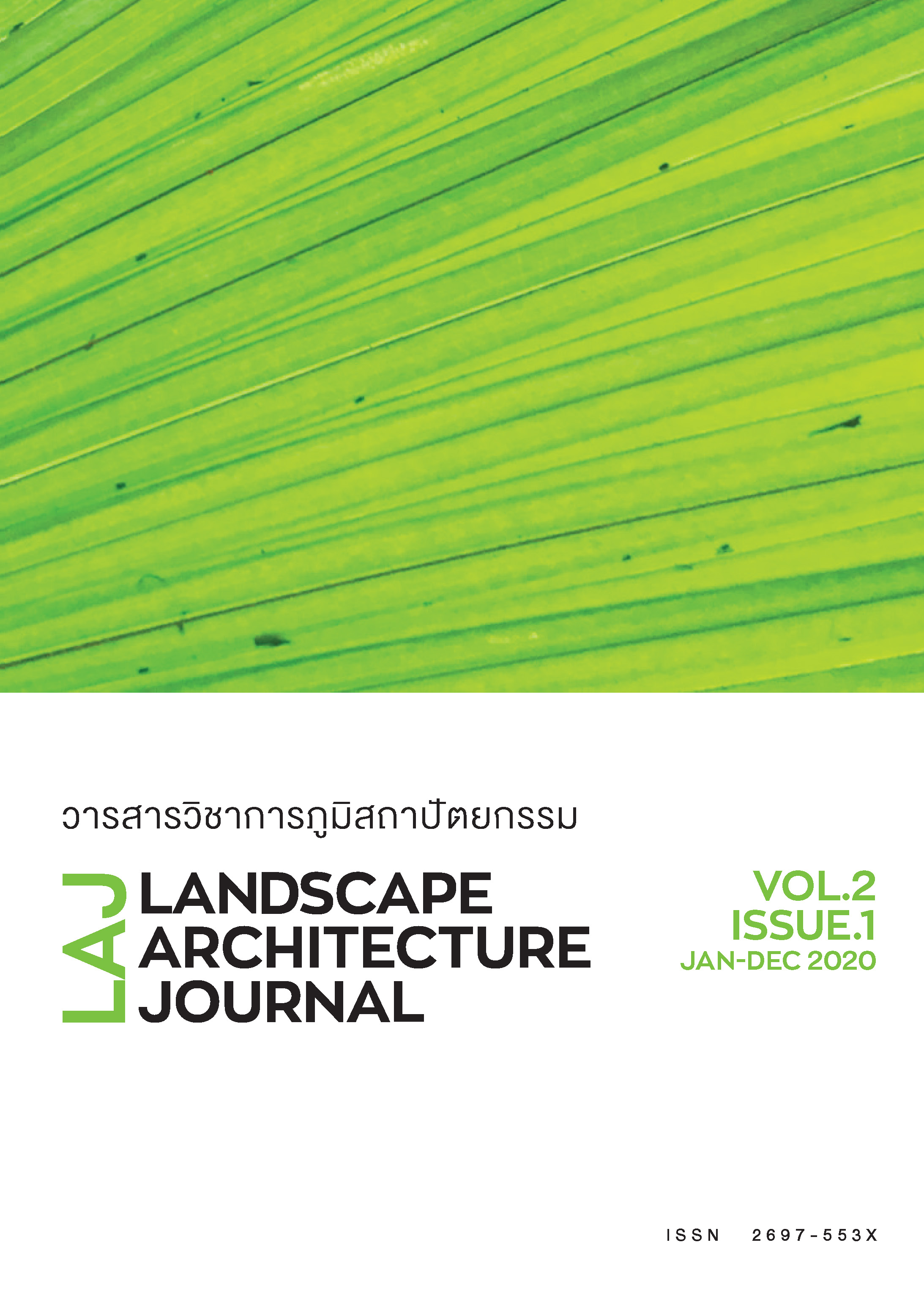Landscape Adaptations and Mitigations for the Impacts of Industrialization on the Food Security: Case Study of Klong Om, Tambol Khao Din, Bangpakong District, Chachoengsao
Main Article Content
Abstract
This article summarizes the outcomes from the studies of the river delta wetland from landscape architectural design and planning. The studies aims to introduce the landscape adaptations and mitigations for the Impacts of Industrialization on the Food Security: Case Study of Klong Om, Tambol Khao Din, Bangpakong District, Chachoengsao. The case study is in the area where EEC covers from the east of Bangkok to these following provinces; Rayong, Chon Buri and Chachoengsao through the fragile wetland of Bangpakong River delta. This large-scaled economic development plan will affect the cultural landscape of the riparian area where there are three different types of ecosystem by the seasons in a year; 1) fresh 2) brackish and 3) salt waters. The dynamic nature of the Bangpakong River has performed a crucial role for breeding and feeding sites for various aquatic vegetation and animals, especially those contribute to household food security. The objectives of the studies are to protect the rich wetland ecosystems and be integrated to the economic development plan in order to reduce the impacts to the cultural landscape and food security. The value of the environmental attractiveness as a resource can draw in investment and jobs and enhances the value of property in the longer term as in the 4 proposed themes; 1) Ecological Service 2) Hybrid Farming Agriculture 3) Aquaculture and 4) The Cultural Landscape and Resilient Communities. The two exercises were performed as part of a Bachelor Thesis in Landscape Architecture and the site of the 2020 International Workshop in Urban Landscape (IWUL 2020), hosted by Department of Landscape Architecture, Chulalongkorn University with the collaborations of University of Seoul (UoS), Tokyo City University (TCU), Technological and Higher Education Institute of Hong Kong (THEI) and Istanbul Technical University (ITU). Finally, there are 8 schemes from the 4 themes.
Article Details

This work is licensed under a Creative Commons Attribution-NonCommercial-NoDerivatives 4.0 International License.
References
2. กลุ่มงานยุทธศาสตร์และข้อมูลเพื่อการพัฒนาจังหวัด. (2562). แผนพัฒนาจังหวัดฉะเชิงเทรา (พ.ศ. 2561 – 2565) (ฉบับทบทวน). สืบค้นจาก http://www.chachoengsao.go.th เมื่อวันที่ 10 พฤษภาคม 2563.
3. คณะกรรมการอาหารแห่งชาติ. (2551). กรอบยุทธศาสตร์ การจัดการด้านอาหารประเทศไทย สืบค้นจาก https://www.foodsafety.moph.go.th/document/Info_general/food_management.pdf เมื่อวันที่ 13 พฤศจิกายน 2562.
4. เดอะเวิร์คส์ คอมมิวนิตี้ แมนเนจเม้นท์. (2561). แนวคิดของการท่องเที่ยวเชิงเกษตร. สืบค้นจาก http://www.theworks.co.th/blog/2018/10/24/agro-tourism/ เมื่อวันที่ ธันวาคม 2562
5. นนทกานต์ จันทร์อ่อน. (2557). ความมั่นคงทางอาหารของประเทศไทย (Thailand Food Security). ห้องสมุดอิเล็กทรอนิกส์วุฒิสภา สำนักงานเลขาธิการวุฒิสภา. ปีที่ 04 ฉบับที่ 02/2557 มกราคม. สืบค้นจาก http://library.senate.go.th/document/Ext7091/7091777_0002.PDF เมื่อวันที่ 10 พฤษภาคม 2563.
6. แผนผังการใช้ประโยชน์ที่ดินผังเมืองอีอีซี ฉบับวันที่ 25 กรกฎาคม 2562 สืบค้นจาก https://www.eeco.or.th/sites/default/files/L_2562.PDF เมื่อวันที่ 10 มกราคม 2563.
7. พระราชบัญญัติคณะกรรมการอาหารแห่งชาติ พ.ศ. 2551. (2551, 8 กุมภาพันธ์). ราชกิจจานุเบกษา. หน้า 40.
8. มูลนิธินวชีวัน (2558). แนวคิดเกษตรยั่งยืน. สืบค้นจาก http://www.advantaseedsth.com เมื่อวันที่ 10 พฤษภาคม 2563.
9. มูลนิธิเกษตรกรรมยั่งยืนแห่งประเทศไทย. (12 กุมภาพันธ์ 2563). ความหมายเกษตรกรรมยั่งยืน. สืบค้นจาก http://sathai.org/2020/02/12/ความหมายเกษตรกรรมยั่งย/
10. วริศรา ธรรมศิริ. (2562). โครงการศูนย์การเรียนรู้การเกษตรเพื่อความมั่นคงทางอาหารประเทศไทย (Thailand Food Security Farming Center) จังหวัดฉะเชิงเทรา. วิทยานิพนธ์ หลักสูตรปริญญาภูมิสถาปัตยกรรมศาสตร์บัณฑิตภาควิชาภูมิสถาปัตยกรรม คณะสถาปัตยกรรมศาสตร์ จุฬาลงกรณ์มหาวิทยาลัย ปีการศึกษา 2562.
11. วิรัลพัชร ประเสริฐศักดิ์ (2562). แนวคิดและคำนิยามของความมั่นคงทางอาหาร (Food Security: Concepts And Definitions). สืบค้นจาก http://www.polsci.tu.ac.th/fileupload/36/24.pdf เมื่อวันที่ 10 พฤษภาคม 2563.
12. สถาบันวิจัยวิทยาศาสตร์และสิ่งแวดล้อมแห่งประเทศไทย. (2539). การท่องเที่ยวเชิงอนุรักษ์. สืบค้นจาก http://std.kku.ac.th/4830801696/nor1/index2.htm (อ้างอิงใน สฤษฎ์ แสงอรัญ, 2548)
13. สฤษฏ์ แสงอรัญ. (2548). การท่องเที่ยวเชิงอนุรักษ์หรือเชิงนิเวศ (Ecotourism). สืบค้นจาก http://www.dnp.go.th/NPO/html/ Tour/Eco_Tour.html เมื่อวันที่ 10 พฤษภาคม 2563.
14. อภิชาติ พงษ์ศรีหดุลชัย, ศรัณย์วรรธนัจฉริยา, เดชา ศุภวันต์ และ สุภาวดี โพธิยะราช. (2554) ความมั่นคงทางอาหารและพลังงานของไทย สืบค้นจาก http://e-library.itd.or.th/viewer/144491129 เมื่อวันที่ 10 พฤษภาคม 2563.
15. Ariya Aruninta and Varissara Dhammasiri. (2020). 2020 IWUL Workshop Booklet. Dept of Landscape Architecture, Chulalongkorn University. 3-10 Aug 2020.
16. Chaiyarak,B., Tattiyakul, G. and Karnsunthad, N. (2019). Climate Change Vulnerability Assessment Bang Pakong River Wetland, Thailand. Bangkok, Thailand: IUCN. X + 73pp.
17. Eastern Economic Corridor (EEC), The 2 Years of EEC. Retrieved August 1, 2020, from https://www.eeco.or.th/en/filedownload/1177/file-2-years-of-eec-english-version
18. Salforest.com. (2019). Sustainable Development. Retrieved December 1, 2019, from http://www.salforest.com/glossary/sustainable-development
19. United Nations Thailand. (2558). Sustainable Development Goals (SDGs) ฉบับเต็ม Retrieved December 1, 2019, from http://e-plan.dla.go.th/activityImage/422.pdf

